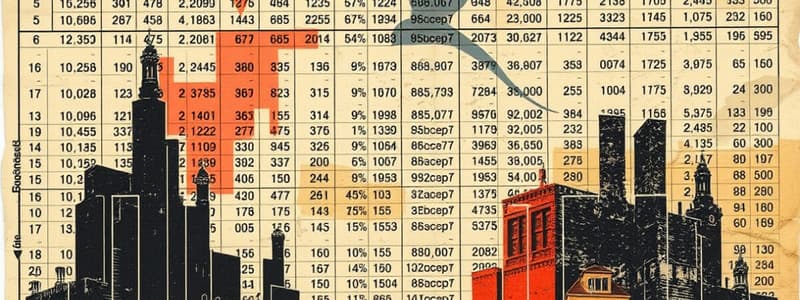Podcast
Questions and Answers
What is the lower class boundary for the class whose limits are 16-25?
What is the lower class boundary for the class whose limits are 16-25?
15.5
What is the lower class boundary of the 3rd class in the given frequency table of Daily Low Temperature?
What is the lower class boundary of the 3rd class in the given frequency table of Daily Low Temperature?
45.5
What is the class width for the class whose class limits are 17 - 19?
What is the class width for the class whose class limits are 17 - 19?
3
What is the class width for the given temperature frequency distribution?
What is the class width for the given temperature frequency distribution?
What is the midpoint of the 3rd class in the given Daily Low Temperature frequency table?
What is the midpoint of the 3rd class in the given Daily Low Temperature frequency table?
What is the relative frequency of the 3rd class in the given height frequency table?
What is the relative frequency of the 3rd class in the given height frequency table?
What is the cumulative frequency of the sixth class in the given frequency table?
What is the cumulative frequency of the sixth class in the given frequency table?
What is the upper boundary of the 2nd class in a frequency table constructed from the given eruption heights?
What is the upper boundary of the 2nd class in a frequency table constructed from the given eruption heights?
Flashcards
Lower Class Boundary
Lower Class Boundary
The value that separates one class from the next, located halfway between the upper limit of the preceding class and the lower limit of the current class.
Class Width
Class Width
The difference between the upper limit and lower limit of a class, representing the range of values within a single class.
Class Midpoint
Class Midpoint
The center point of a class, calculated by averaging the upper and lower class limits.
Relative Frequency
Relative Frequency
Signup and view all the flashcards
Cumulative Frequency
Cumulative Frequency
Signup and view all the flashcards
Study Notes
Frequency Boundaries
- The lower class boundary for the class limits of 16-25 is 15.5.
- For the Daily Low Temperature frequency table, the lower class boundary of the 3rd class (46-48) is 45.5.
Class Width Calculation
- The class width for the class limits 17-19 is determined as 3, calculated from the difference between the lower limits of consecutive classes.
- In another example, the class width for the temperature frequency distribution (32-36, 37-41) is 5.
Class Midpoints
- The midpoint for the 3rd class (46-48) in the Daily Low Temperature table is 47, calculated by averaging the lower and upper class limits.
Relative Frequencies
- The relative frequency of the 3rd class for the height frequency table (67.0-68.9) is 23.1%, calculated by dividing the class frequency (9) by the total frequency (39) and multiplying by 100.
Cumulative Frequency
- The cumulative frequency for the 6th class in the Daily Low frequency table (60-64) totals 32, obtained by summing the frequencies of all classes up to the 6th class.
Creating Frequency Tables
- To create a frequency table with 4 classes for eruption heights, the upper boundary of the 2nd class (110-123) is 123.5. The frequency distribution shows ranges: 95-109 (3), 110-123 (6), 124-137 (8), 138-152 (3).
Summary of Class Boundaries and Frequencies
- Class intervals require consistent calculations of upper/lower boundaries, class widths, midpoints, and cumulative frequencies to interpret data effectively.
- Understanding the calculation methods is essential for accurate frequency table construction and data analysis.
Studying That Suits You
Use AI to generate personalized quizzes and flashcards to suit your learning preferences.




